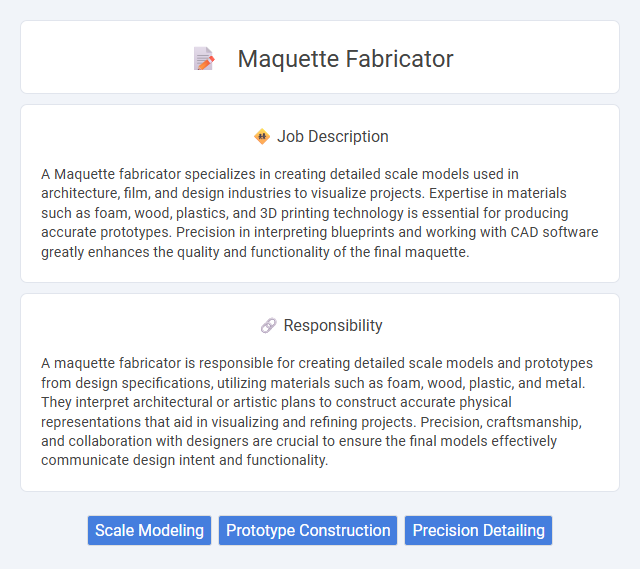
A Maquette fabricator specializes in creating detailed scale models used in architecture, film, and design industries to visualize projects. Expertise in materials such as foam, wood, plastics, and 3D printing technology is essential for producing accurate prototypes. Precision in interpreting blueprints and working with CAD software greatly enhances the quality and functionality of the final maquette.
Individuals with strong attention to detail and good manual dexterity are likely suitable for a Maquette fabricator job, as the role involves creating precise scale models. Those who enjoy working with their hands and possess patience may find this position well-suited to their skills, while people who struggle with fine motor tasks or have low tolerance for repetitive work might face challenges. A propensity for spatial awareness and basic understanding of design concepts also increases the probability of success in this role.
Qualification
A Maquette fabricator must possess strong skills in model making, including proficiency with materials such as foam, wood, plastics, and metals, as well as expertise in cutting, shaping, and assembling precise scale models. Experience with CAD software and 3D printing technology is highly valuable for creating detailed design prototypes. Attention to detail, craftsmanship, and the ability to interpret architectural or product design plans are essential qualifications for success in this role.
Responsibility
A maquette fabricator is responsible for creating detailed scale models and prototypes from design specifications, utilizing materials such as foam, wood, plastic, and metal. They interpret architectural or artistic plans to construct accurate physical representations that aid in visualizing and refining projects. Precision, craftsmanship, and collaboration with designers are crucial to ensure the final models effectively communicate design intent and functionality.
Benefit
Maquette fabricator jobs probably offer benefits such as gaining hands-on experience in model making and enhancing precision skills essential for architectural or design projects. Employees might enjoy the opportunity to work closely with creative teams, fostering collaboration and innovation. The role could also provide access to specialized tools and materials that contribute to professional growth and portfolio development.
Challenge
Working as a maquette fabricator likely involves complex challenges requiring precision and creativity to transform conceptual designs into detailed, physical models. The role may demand advanced skills in various materials and fabrication techniques to accurately represent architectural or artistic visions. Problem-solving abilities could be essential to address unexpected design issues and ensure the final model meets specific project criteria.
Career Advancement
A maquette fabricator's career advancement often involves mastering advanced model-making techniques and gaining expertise in materials like resin, clay, and 3D printing technologies. Progression may lead to roles such as senior model maker, art director, or product designer, where leadership and creative decision-making skills become essential. Building a strong portfolio and networking within architectural, film, or design industries significantly increases opportunities for career growth and specialization.
Key Terms
Scale Modeling
Maquette fabricators specialize in creating detailed scale models used in architectural design, film production, and product development to visualize projects accurately. Precision in materials like foam, wood, and plastics is essential for replicating textures and structures at reduced scales. Mastery of CAD software and handcrafting techniques enables fabricators to produce maquettes that aid in client presentations and iterative design processes.
Prototype Construction
Maquette fabricators specialize in prototype construction by transforming detailed designs into precise scale models used for visualization and testing. They utilize materials like foam, wood, plastic, and metal, applying advanced techniques such as CNC machining and 3D printing to ensure accuracy and durability. Their expertise supports product development, architectural presentations, and industrial designs by providing tangible representations that aid in design evaluation and refinement.
Precision Detailing
A Maquette Fabricator specializes in creating highly detailed scale models used in architectural and design presentations, emphasizing precision detailing to ensure every element accurately reflects the original design. Mastery in working with diverse materials such as wood, plastic, and foam enables the fabricator to replicate intricate textures and fine features with exceptional accuracy. Proficiency in tools like laser cutters, 3D printers, and handcrafting techniques is essential for achieving the meticulous precision required in model fabrication.
 kuljobs.com
kuljobs.com